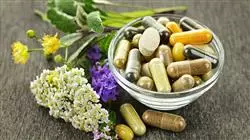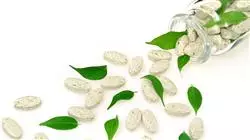University certificate
Scientific endorser

The world's largest faculty of physiotherapy”
Introduction to the Program
You will easily update your knowledge in Applied Phytotherapy thanks to the specialized and referential teaching staff that teaches this program"

The current challenge of phytotherapy is to achieve greater effectiveness in the treatment of certain pathologies. Scientific advances in this field have consolidated this discipline, which has been allied in recent years with new technologies to achieve greater precision in treatments. In addition, studies have shown positive results in dermatology, parasitic diseases or musculoskeletal conditions. It is precisely in this area where the physiotherapist finds in phytotherapy a tremendously useful tool to complete the patient's recovery.
According to recent scientific postulates, the most frequent ailments in the lumbar and cervical spine or joint injuries such as arthritis or rheumatism can be effectively treated with phytotherapy. Thus, the progress in this field and the greater acceptance by the population in this type of therapies have led TECH to design this Professional master’s degree, which offers the professional the most current and relevant information.
For this purpose, the specialist will have a team of professionals versed in this field, who will bring them closer, throughout 12 months, to the most advanced and current knowledge on Advances in Applied Phytotherapy . Through multimedia teaching resources, the students will be able to deepen in a much more dynamic way in the progress of phytotherapy in the treatment of muscular contractures, gout, sarcopenia or as an anti-inflammatory action in joint pain. Likewise, the case studies provided by the teaching staff of this program will bring the professional closer to situations where they can implement this discipline in their usual clinical practice.
TECH also offers a quality university qualification that can be accessed at any time of the day from a device with an internet connection. In addition, the professional has the option of distributing the teaching load according to their needs, thus allowing them to combine a program that is at the academic forefront with the most demanding responsibilities.
You will learn about the latest advances in the cultivation, harvesting, processing and conservation of medicinal plants and their effectiveness in certain pathologies"
This Professional master’s degree in Advances in Applied Phytotherapy contains the most complete and up-to-date scientific program on the market. The most important features include:
- Practical case studies are presented by experts in Phytotherapy
- The graphic, schematic, and practical contents with which they are created, provide scientific and practical information on the disciplines that are essential for professional practice
- Practical exercises where self-assessment can be used to improve learning
- Its special emphasis on innovative methodologies
- Theoretical lessons, questions to the expert, debate forums on controversial topics, and individual reflection assignments
- Content that is accessible from any fixed or portable device with an Internet connection
With this Professional master’s degree, you will be able to update your knowledge on the proper use of plant-based drugs and plant toxicity"
The program’s teaching staff includes professionals from the sector who contribute their work experience to this program, as well as renowned specialists from leading societies and prestigious universities.
The multimedia content, developed with the latest educational technology, will provide the professional with situated and contextual learning, i.e., a simulated environment that will provide immersive knowledge programmed to learn in real situations.
This program is designed around Problem-Based Learning, whereby the professional must try to solve the different professional practice situations that arise throughout the program. For this purpose, the student will be assisted by an innovative interactive video system created by renowned and experienced experts.
With this qualification, you will learn more about the active plant ingredients in the treatment of cardiovascular problems"

You will have access 24 hours a day to the most advanced and current multimedia content on the application of phytotherapy in patients with osteoarthritis problems"
Why study at TECH?
TECH is the world’s largest online university. With an impressive catalog of more than 14,000 university programs available in 11 languages, it is positioned as a leader in employability, with a 99% job placement rate. In addition, it relies on an enormous faculty of more than 6,000 professors of the highest international renown.

Study at the world's largest online university and guarantee your professional success. The future starts at TECH”
The world’s best online university according to FORBES
The prestigious Forbes magazine, specialized in business and finance, has highlighted TECH as “the world's best online university” This is what they have recently stated in an article in their digital edition in which they echo the success story of this institution, “thanks to the academic offer it provides, the selection of its teaching staff, and an innovative learning method aimed at educating the professionals of the future”
A revolutionary study method, a cutting-edge faculty and a practical focus: the key to TECH's success.
The most complete study plans on the university scene
TECH offers the most complete study plans on the university scene, with syllabuses that cover fundamental concepts and, at the same time, the main scientific advances in their specific scientific areas. In addition, these programs are continuously being updated to guarantee students the academic vanguard and the most in-demand professional skills. In this way, the university's qualifications provide its graduates with a significant advantage to propel their careers to success.
TECH offers the most comprehensive and intensive study plans on the current university scene.
A world-class teaching staff
TECH's teaching staff is made up of more than 6,000 professors with the highest international recognition. Professors, researchers and top executives of multinational companies, including Isaiah Covington, performance coach of the Boston Celtics; Magda Romanska, principal investigator at Harvard MetaLAB; Ignacio Wistumba, chairman of the department of translational molecular pathology at MD Anderson Cancer Center; and D.W. Pine, creative director of TIME magazine, among others.
Internationally renowned experts, specialized in different branches of Health, Technology, Communication and Business, form part of the TECH faculty.
A unique learning method
TECH is the first university to use Relearning in all its programs. It is the best online learning methodology, accredited with international teaching quality certifications, provided by prestigious educational agencies. In addition, this disruptive educational model is complemented with the “Case Method”, thereby setting up a unique online teaching strategy. Innovative teaching resources are also implemented, including detailed videos, infographics and interactive summaries.
TECH combines Relearning and the Case Method in all its university programs to guarantee excellent theoretical and practical learning, studying whenever and wherever you want.
The world's largest online university
TECH is the world’s largest online university. We are the largest educational institution, with the best and widest online educational catalog, one hundred percent online and covering the vast majority of areas of knowledge. We offer a large selection of our own degrees and accredited online undergraduate and postgraduate degrees. In total, more than 14,000 university degrees, in eleven different languages, make us the largest educational largest in the world.
TECH has the world's most extensive catalog of academic and official programs, available in more than 11 languages.
Google Premier Partner
The American technology giant has awarded TECH the Google Google Premier Partner badge. This award, which is only available to 3% of the world's companies, highlights the efficient, flexible and tailored experience that this university provides to students. The recognition as a Google Premier Partner not only accredits the maximum rigor, performance and investment in TECH's digital infrastructures, but also places this university as one of the world's leading technology companies.
Google has positioned TECH in the top 3% of the world's most important technology companies by awarding it its Google Premier Partner badge.
The official online university of the NBA
TECH is the official online university of the NBA. Thanks to our agreement with the biggest league in basketball, we offer our students exclusive university programs, as well as a wide variety of educational resources focused on the business of the league and other areas of the sports industry. Each program is made up of a uniquely designed syllabus and features exceptional guest hosts: professionals with a distinguished sports background who will offer their expertise on the most relevant topics.
TECH has been selected by the NBA, the world's top basketball league, as its official online university.
The top-rated university by its students
Students have positioned TECH as the world's top-rated university on the main review websites, with a highest rating of 4.9 out of 5, obtained from more than 1,000 reviews. These results consolidate TECH as the benchmark university institution at an international level, reflecting the excellence and positive impact of its educational model.” reflecting the excellence and positive impact of its educational model.”
TECH is the world’s top-rated university by its students.
Leaders in employability
TECH has managed to become the leading university in employability. 99% of its students obtain jobs in the academic field they have studied, within one year of completing any of the university's programs. A similar number achieve immediate career enhancement. All this thanks to a study methodology that bases its effectiveness on the acquisition of practical skills, which are absolutely necessary for professional development.
99% of TECH graduates find a job within a year of completing their studies.
Professional Master's Degree in Advances in Applied Phytotherapy
Among the advances in the health sector is the use of curative alternatives to treat diseases or specific symptoms effectively. One option widely used today is herbal medicine, a therapeutic treatment used to treat diseases with medicinal plants. However, in order to work in this area it is necessary to acquire the appropriate training to develop this work correctly. For this reason, in TECH we have designed a Professional Master's Degree in Advances in Applied Phytotherapy that, in addition to deepen the scientific support, will allow you to know the established safety protocols to perform a preventive intervention to different pathologies. By taking this Postgraduate Certificate of high academic level, you will specialize in current health trends for the use of safe natural remedies; in this way, you will obtain knowledge and skills related to the use of plants. Thanks to this, you will be able to classify plant groups and thus, understand their botanical nomenclature in the initiated procedures.
Take an online Professional Master's Degree at the largest School of Physiotherapy
If you want to revalue your profile as a physiotherapist and incorporate new skills to improve the practice of your profession, in TECH you will find the ideal option to enhance your skills in this area and thus, stand out in the workplace. We provide you with the most innovative teaching methodology in the market; achieving to enhance your skills to achieve optimal results when recommending this type of therapeutic treatments. Throughout one year you will learn in depth the clinical approach of these treatments, which includes the galenic preparations, the active principles and the toxicity of the plants. Using these methods will allow you to treat pathologies ranging from endocrine, metabolic and digestive disorders to cardiovascular, respiratory and locomotor system disorders, among others.







